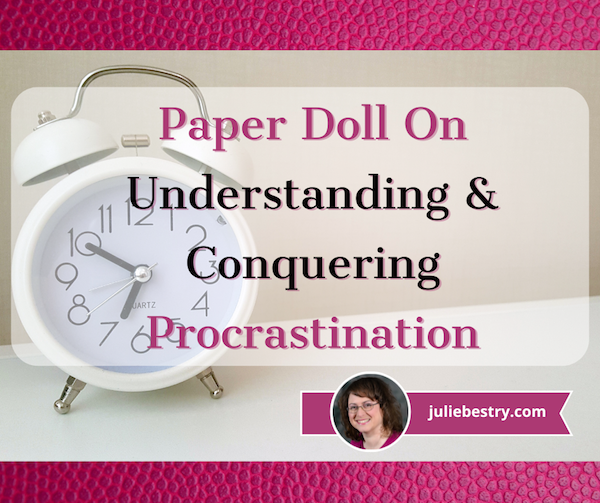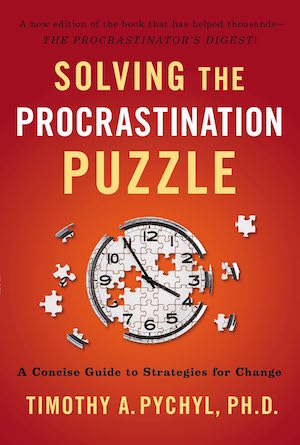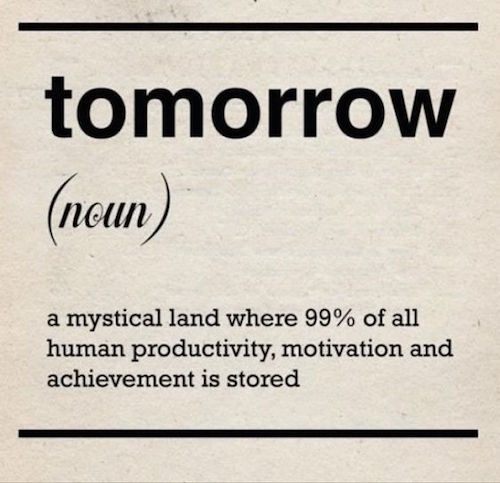Paper Doll On Understanding and Conquering Procrastination

Nothing is so fatiguing as the eternal hanging on of an uncompleted task. ~ William James
We all procrastinate. Everyone knows that it’s irrational to put off doing something until the quality of the work might suffer. It’s obvious that it doesn’t make sense to keep not doing something when the deadline is fast approaching. And yet, at least sometimes, everyone procrastinates.
WHAT IS PROCRASTINATION?
Contrary to what you might have been told in your childhood (or even more recently), procrastination is not about laziness. Rather, it’s a self-protective mechanism.
Research shows that we use procrastination as a technique to regulate our moods. More specifically, to regulate, manage, and prioritize a negative emotion in the present over the negative outcome of our procrastination in the future.
Instead of delving into the science and scaring you off with words like amygdala and prefrontal cortex, here’s a cartoon to ease you into what’s actually happening in your brain when you procrastinate.
WHAT TRIGGERS PROCRASTINATION?
The tippy-top expert on procrastination, Canadian professor of psychology Timothy Pychyl of Carleton University in Ottawa, is the author of Solving the Procrastination Puzzle.

According to Pychyl, there are seven triggers that cause people to procrastinate:
- Boredom — Whether a child is delaying doing homework because the assignment isn’t challenging or an adult is facing a stultifying task (vacuuming, I’m looking at you!), doing anything stimulating (even if it’s counterproductive) may feel better than doing the boring thing.
- Frustration — The task itself may be frustrating because it’s full of difficult, fiddly little steps, like putting together a spreadsheet from multiple sources of data or figuring out how to build an Ikea desk without any written instructions; or, you might be frustrated because the work involves dealing with annoying members of your team.
- Difficulty — When something seems like it’s going to be too mentally or physically taxing, it’s comforting to procrastinate. Sometimes we tell ourselves that we’re preparing, or doing pre-work, to set the stage for the difficult task, but there are only so many pencils your teen can sharpen before settling in on that calculus homework.
- Lack of Motivation — This may seem the same as boredom, but it’s actually more complex. Boredom is mostly about the task; some activities are just inherently lacking in stimulation. But motivation relates to internal drive. Even if you aren’t happy in your current role at work, you may not be that excited about applying for a new job (perhaps because of depression, anxiety, or fear of change). You have to see the benefit of working on your resume and prepping for an interview as steps toward a personal goal of being more professionally confident, rather than just items to be completed to “get a job,” which may not be inherently motivating.
- Lack of Focus — Mental focus depends on physical and emotional stimuli as well as external stimuli. A variety of emotional concerns related to the task at hand — fear of failure, being embarrassed in public, losing a scholarship or a job — as well as unrelated issues like family or relationship troubles, or health concerns, can detract from your focus. Similarly, working in a crowded or noisy space, or even in an environment with visually distracting elements, can dilute your focus. Some people need to turn down the radio while driving to find the address they’re seeking; others need a tidy desk in order to read, even if the desk is outside their line of sight. You can’t focus if you’re hungry or tired, either.
- Feeling Overwhelmed — Too much of too much will always keep you from taking clear action. In the professional organizing field, we talk about suffering from decision fatigue and often say, “The overwhelmed mind says ‘No’.” Have you ever stood in the toothpaste or shampoo aisle and been shocked by the ridiculous number of competing alternatives? Similarly, if there are many different ways to approach a talk (writing a blog, replying to an email, making a plan for a move), overwhelm may lead us to just physically or mentally wander away.
so much to do pic.twitter.com/fiSm7Y2Erg
— poorly drawn lines (@PDLComics) December 21, 2022
- Being Overworked — Burnout is definitely a trigger for procrastination. If you’ve ever worked day-in and day-out on a project such that by the time you got home, you had literally no mental space or physical energy to do anything, even to prepare food, that’s a sure sign of overwork. Alternative options might be more or less pleasant (think: socializing or housework), but you might choose to lay on your couch and mindlessly scroll through social media instead of either thing you were supposed to do. Overwork eliminates the energy necessary for doing anything in the now, so everything gets pushed to a theoretical later.
Of course, Pychyl is not the only one to define triggers for procrastination. Others have identified fear of failure, impulsiveness (sometimes associated with ADHD), and generalized anxiety. Various executive function disorders can make it difficult to sequence or prioritize tasks.
The point is, procrastination is not laziness, but a conscious or even subconscious need to not feel icky now, even if you’re going to feel doubly icky later.
Procrastination is not laziness, but a conscious or even subconscious need to not feel icky now, even if you're going to feel doubly icky later. Click To TweetPRACTICAL STRATEGIES TO COMBAT PROCRASTINATION
Obviously, once you identify your trigger to procrastinate, you can employ techniques to reverse the behavior. For example, if a task is boring, like housework or working out, you might pair it with music or a streaming TV show.
It also may be helpful to take away the temptations of more entertaining options. Lock your phone in a drawer — having to unlock it to play Candy Crush may give you the necessary pause to stick with your task. If you’re tempted by websites that are more entertaining than the work you’re supposed to be doing, lock yourself out of those websites (for whatever time period you set) by using a website-blocking program like:
Cold Turkey — works with Windows and MacOS
Focus — works with MacOS-only
Forest — designed for your phone, it works with Android, iOS, and in your Chrome browser
Freedom — works with Windows, macOS, iOS, Android, in as a plugin for Chrome
LeechBlock — works in various browsers, including Chrome, Firefox, Edge, and Opera (but not Safari)
Rescue Time — works with Windows, macOS, Android, iPhone, and iPad
Self-Control — works with acOS-only
There’s also Paw Block, which, while it only works as a Chrome or Firefox extension, has the benefit of showing you pictures of kittens from the around the internet when it prevents you from accessing distracting websites.

If you’re frustrated by the elements or situation of the task, you might bring in a friend or colleague to help you do it, someone who doesn’t have the emotional connection to the stressors that are throwing you off. They don’t necessarily need to perform the tasks, but just body double with you so you feel soothed and less frustrated.
You can break down difficult tasks into the tiniest possible elements, or seek a supervisor’s guidance, so the annoyances seem less annoying. (It’s tricky in the moment, but you might also try to reframe “difficult” tasks as challenges and contests with yourself.)
If you’re feeling unmotivated, see if you can find a short-term reward. (Cake? Cake is always good! But a refreshing walk outside after finishing the first of three elements of a task may help you get your head back in the game.) For a deeper lack of motivation, work with a therapist or coach to help you identify the meaningful benefits you can get from doing the things at which you tend to procrastinate, or possibly find a life path that eliminates those tasks. (If creating PowerPoint slide decks gives you a stomachache, maybe you need to consider becoming a lumberjack or a lighthouse keeper. Not everyone wants to be an knowledge worker, and that’s OK!)
If your procrastination is due to floundering focus, determine what’s contributing to the lack of focus. If it’s internal (troublesome thoughts and emotions), consider meditation, walking in nature, and talking through the excess thoughts with a friend and/or in therapy.
But if it’s external, if you’re feeling attacked from all sides by an overload of sensory stimuli, you may need to declutter and organize your space or move your workspace elsewhere (or invest in noise-canceling headphones). But it’s possible you’ll want to see if an ADHD or other diagnosis might help support your efforts to get assistance dealing with distractions.
Overwhelm may seem a lot like frustration. While you may be frustrated by just one (big) annoying thing, overwhelm feels like you’re getting pelted with dodge balls from all directions. It’s a good time to sit down with someone who can help you see the Big Picture and identify the priorities and sequences. Professional organizers and productivity specialists excel at helping you battle overwhelm and get clarity.
And if you’re overworked and experiencing burnout, it’s time to have a realistic discussion with your partner, therapist, boss, and anyone else who can help you achieve balance before you suffer health consequences more serious than just the emotional distress related to procrastination.
In the short term, some meditation and schedule modifications might work, but if you’re experiencing chronic overwork, more intense career and life changes might be necessary. Start by revisiting my series on toxic productivity, below, and pay special attention to post #3.
Toxic Productivity In the Workplace and What Comes Next
Toxic Productivity Part 2: How to Change Your Mindset
Toxic Productivity Part 3: Get Off the To-Do List Hamster Wheel
Toxic Productivity, Part 4: Find the Flip Side of Productivity Hacks
Toxic Productivity Part 5: Technology and a Hungry Ghost
You’re more than your job pic.twitter.com/qAHwtnT6Ux
— Junhan Chin | Illustrator (@junhanchin) August 31, 2022
EMOTIONAL AND INTELLECTUAL STRATEGIES TO COMBAT PROCRASTINATION
Making changes in your space and schedule, breaking your projects into smaller tasks, and giving yourself rewards are all smart practical solutions, but they’re external. Changing your external world can only eliminate some of the obstacles to your productivity. To truly conquer procrastination, experts advise making internal changes as well.
Admit it!
Denial is not just a river in Egypt. When you catch yourself procrastinating, acknowledge it. Once you call your own attention to the fact that you’re delaying doing the thing you’re supposed to be doing, you can look at that list of triggers and say, “Yikes! I’m avoiding writing this report. Why is that?” You can’t solve a problem if you don’t realize it exists. Admitting it gets you halfway to a solution.

Forgive yourself
This isn’t the same as letting yourself continue to procrastinate. And just like forgiving someone else isn’t the same as saying that the undesirable behavior never occurred, forgiving yourself gives you the opportunity to recognize that past behavior doesn’t have to dictate future performance.
A 2010 study by Michael J.A. Wohl, Timothy A. Pychyl, and Shannon H. Bennett entitled I Forgive Myself, Now I Can Study: How Self-Forgiveness for Procrastinating Can Reduce Future Procrastination found, as the title indicates, that students who forgave themselves for procrastinating on preparing for exams earlier in the semester were far less likely to procrastinate on studying for the next exams.
You’re human; if you were a perfect person … well, you’d be the first one ever. Forgive yourself for having procrastinated in the past.
Practice self-compassion
Related to self-foriveness is self-compassion. Researchers found that people who procrastinate tend to have higher stress levels and lower levels of self-compassion, and theorized that compassion cushions some of the more negative, maladaptive responses that cause repeated procrastination.
Think of it as similar to overeating. If you cheat on your diet, low self-compassion might get you so down on yourself that you figure, “I’ll never lose this weight. I might as well just eat the whole ice cream carton!” But if you’re able to have self-compassion, you may tell yourself, “Yup, I did eat more than a half-cup serving of ice cream. But I understand why I did it. Next time, I’ll try drinking a glass of water and walking around the block first. Or maybe I’ll go out and eat the ice cream on the front porch, where the rest of the carton won’t be so accessible!”
(Seriously, whoever thought half a cup of ice cream was an adequate serving, anyway?)
Be intentional
All of the alternatives I described up above for seeking assistance and changing your environment (and the ones we’ll discuss next week) will only happen if you place your intention and attention on making changes.
Yes, this means a little extra labor on your part. If you know you procrastinate because you anticipate interruptions (from co-workers in the office or tiny humans when remote-working), you’re creating a problem before the problem exists, so you’re missing out on productivity before you need to and then again when the problem actually occurs. (And then you’ll spend the time after the interruptions being resentful about them, and that will lead to less productivity, too!)
Once you know what you’re up against and which triggers present a problem for you, build time into your schedule to plan your way around the obstacles and triggers. That might mean seeking out time with professionals who can help you, whether those are therapists, professional organizers, productivity specialists, or life or career coaches.
Embrace consistency
The various popular books on forming habits, like James Clear’s Atomic Habits, all agree that it starts with changing your identity, and seeing yourself as “the kind of person who” does things in a more agreeable, positive way.
Showing up daily is easier than showing up once in a while. pic.twitter.com/5CrOdIQjCu
— Sarah Arnold-Hall (@saraharnoldhall) February 6, 2023
One of the ways you can prod the formation of that kind of identity is to develop consistent actions and behaviors. In order to be the kind of person who goes to bed on time (and thus, can get up on time), you need to jettison the behavior of doom-scrolling for hours before bed. To consistently do that, you might set an alert on your phone for 8 p.m. to put the phone away, somewhere far from the couch or your bed. (Afraid you won’t get up on time if the phone isn’t near your sleeping area? Revisit my post from last summer, Do (Not) Be Alarmed: Paper Doll’s Wake-Up Advice for Productivity.)
Be a Self-Starter
You’ve heard me talk about activation energy before. In my post, Rhymes With Brain: Languishing, Flow, and Building a Better Routine, I wrote:
We also depend on activation energy. Because the hardest part of what we do is the getting started, we have to incentivize ourselves to get going. There are all sorts of ways we can trick ourselves (a little bit) with rewards, like pretty desk accessories or a coffee break, but the problem is that action precedes motivation. We’re not usually psyched to get going until we have already started!
Action precedes motivation. We're not usually psyched to get going until we have already started, whether it's a runner's high or Csikszentmihalyi's flow. Click To TweetA huge key to breaking the procrastination habit is getting started. After all, Sir Isaac Newton’s First Law of Motion states that a body at rest tends to stay at rest and a body at motion tends to stay in motion. (OK, it actually says, “a body at rest will remain at rest unless an outside force acts on it, and a body in motion at a constant velocity will remain in motion in a straight line unless acted upon by an outside force.” But this isn’t Physics 101.)
Did you watch the cartoon at the start of this post? (It’s OK if you skipped it; just scroll up and watch now and we’ll wait.) If you did watch, you know that you’re more likely to feel negative emotions about a task when you’re avoiding it, but when you’re actually doing the task, it doesn’t feel so bad.
So, get yourself in motion so that you can stay in motion! Get yourself past the hurdle of starting and that small victory of starting, and the realization that it wasn’t as bad as you feared, might make you less likely to procrastinate the next time you’re facing that same challenge.
GET STARTED AT GETTING STARTED
Once you’ve read all of the preceding advice, you still have to get your butt in the chair. (OK, yes, you could use a standing desk. Let’s not be pedantic!) There are two key ways to do that.
First, embrace accountability. As I’ve previously described in these various posts, borrowing willpower from others by getting support from “partners in crime” can be just the motivation you need to get started and stick with it, whatever the “it” is:
Paper Doll Sees Double: Body Doubling for Productivity
Paper Doll Shares 8 Virtual Co-Working Sites to Amp Up Your Productivity
Count on Accountability: 5 Productivity Support Solutions
Flow and Faux (Accountability): Productivity, Focus, and Alex Trebek
Second, even when you’ve got accountability support (and especially when you don’t), there are techniques for helping you get started on tasks in ways that feel hopeful, and that make finishing seem possible.
So, come back for next week’s post, Frogs, Tomatoes, and Bees: Time Techniques to Get Things Done, where we’re going to be doing a deep dive into a variety of well-known and sleeper strategies for eliminating procrastination. We’ll be talking about tomatoes and frogs, blocks and tocks, and so many numbers that you’ll think we’re in math class. (But I promise, just in case you tended to procrastinate on math homework, there will be no trains leaving Chicago at 120 miles per hour.)
Until next time, read more about the nature and causes of procrastination:
Why You Procrastinate (It Has Nothing To Do With Self-Control) ~ The New York Times
Why People Procrastinate: The Psychology and Causes of Procrastination ~ Why People Procrastinate
6 Common Causes of Procrastination ~ Psychology Today
7 Triggers of Procrastination ~ ChrisBaily.com
Procrastination triggers: eight reasons why you procrastinate ~ Ness Labs
When you tend to procrastinate, what triggers tend to haunt you? What methods do you use to keep procrastination at bay?




Website blocking programs are a wonderful option to combat procrastination. I didn’t realize there were that many. Thanks for sharing!
And there are so many more! I was just trying to hit the major ones. There’s really a lot of technology available to help us counteract technology! 😉
Wow, Julie. So many helpful thoughts and images. I find these illustrations really touch me. They sort of reach me at a different level than the words.
I have to agree with the idea of having action. When we get to the point where we just do the action “automatically,” we are halfway there, right? This is true for me and exercise. I was struggling to get started each day, and usually talked myself out of it as the day went on. Then a friend told me about some back exercises that only took about 5 minutes. I figured I could do this, so I started doing these before anything else (well, after the morning teeth brushing and stuff…). Funny thing was, once I was down in the basement, exercising, it was pretty easy to just add a little bit more. Now this is my habit. I’m walking down to the basement before I start developing reasons not to.
Exercise is the perfect parallel; so much fitness advice starts with, “just do three reps” or “just do it for 5 minutes” and I’ll be getting to that metaphor with next week’s post. (In fact, the material in next week’s post was the plan for today’s, but the introductory concepts became a posed all by themselves! And I only sat down to write for five minutes! LOL.
This is chock full of great information, Julie. I love Timothy Pschyl. He has taught quite a few ICD classes and always has relevant, actionable advice. I have another book to add to your list. It addresses procrastination among other fabulous topics – like being overly busy. It is: Laziness Does Not Exist by Devon Price, Ph.D. He is one of the speakers at the 2023 ICD conference.
I am looking forward to reading your next installment!
Oooh, Diane, I’m adding Price’s book to my reading list.
I bet Pychyl is amazing to hear in person — smart and Canadian, what’s not to like?!
There’s so much here. And as always, you’ve given us tons of resources and ideas about why we procrastinate and what we can do about it. I tend NOT to be a procrastinator. However, I’ve noticed how, lately, what feels like procrastination comes to visit me more.
The idea of “activation energy” resonates deeply with me. Typically, I have zero problems with activation. My internal motivation system is strong. But when I find myself leaning toward the procrastination mode, it seems to revolve around that aspect…difficulty activating. So like, you suggested, after first identifying what is going on? I do some diving into why I’m stuck (procrastinating.) Once I figure that piece out, I’m able to move forward. Sometimes I have to, as you said, “get my butt in the seat.” Other times I need an accountability partner to work with. And other times, I need to break down that next step to something teeny tiny.
Once I can activate, things usually get moving from there.
Also, I love the video! You always find the best resources, Julie!
Awww, you’re lovely, Linda! Thank you! I always like to get lots of different opinions before forming my own, and although there can be too many options for resources, I always like to err on the side of giving people alternatives. (Personally, the cat photos would get old for me; someone needs to make a version with babies!)
I, too, have the most issue with activation energy, and it almost always revolves around something that, deep down, I just plain don’t want to do. That lack of motivation will kick me every time! Next week, we’ll work on tricking ourselves into generating that activation energy!
It’s always a great conversation to have with people to make sure they understand the difference between laziness and procrastination and then they can really start to understand the true underlying cause of their struggles and not simply feel like they have failed at something. Thanks for a great post.
And thank you for reading! There’s so much misunderstanding about why people have clutter and procrastination, or why they’re late; sometimes I think the best thing we do is get the word out about what really underlies these problematic circumstances.
Some of us might be tempted to go off task just to see the kitty pictures! 😀 ?
Meow! This post was so much fun to write (in part because of all the great graphics I’d set aside) that I didn’t procrastinate on writing it all! Irony!